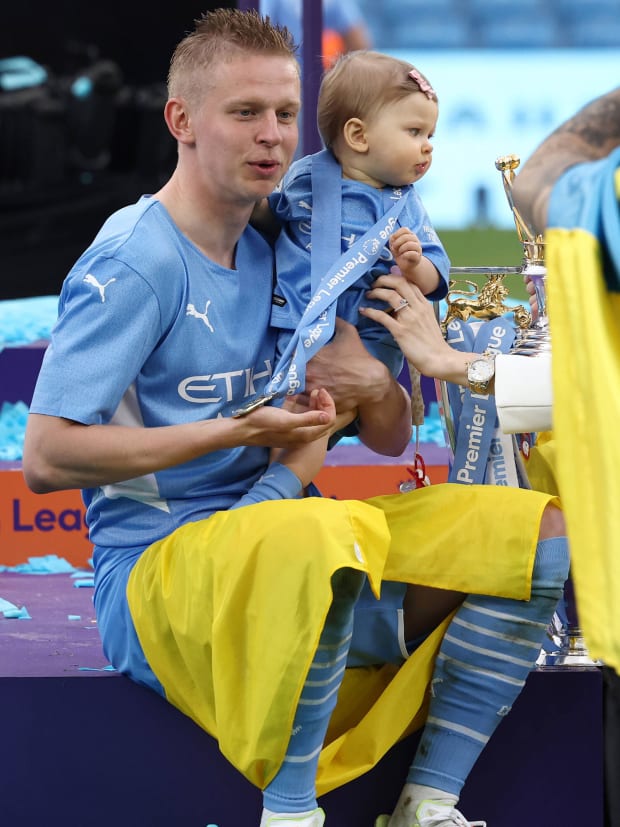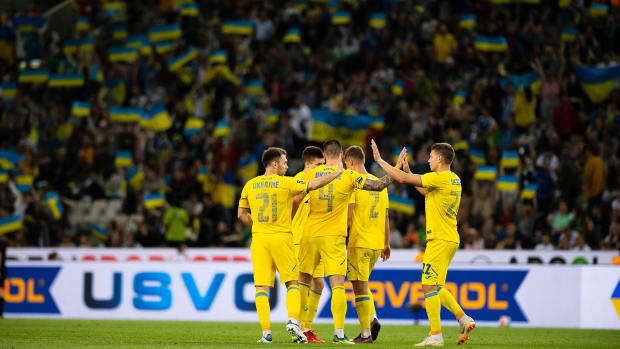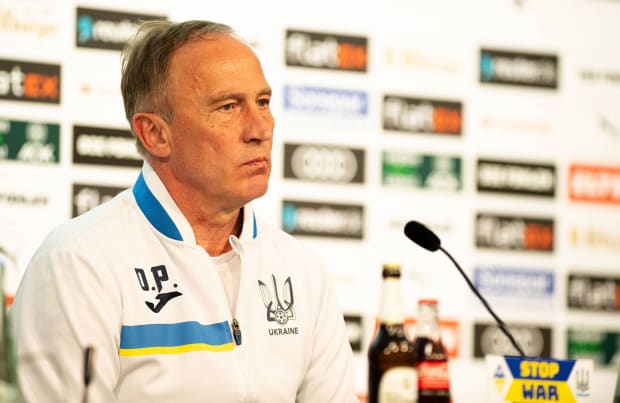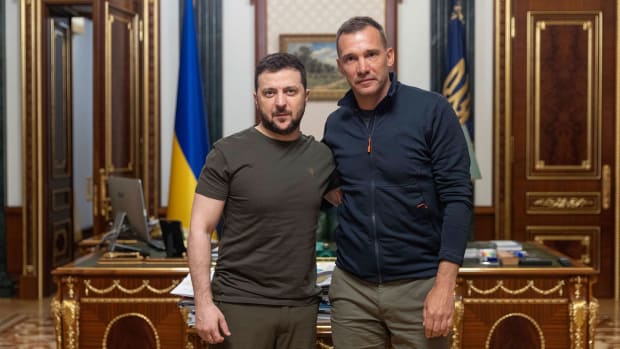View the original article to see embedded media.
GLASGOW, Scotland — On the eve of a World Cup qualifier between Ukraine and Scotland, emotions are high. It is the only guarantee ahead of a match whose significance will extend far beyond the confines of Hampden Park.
On Wednesday, the Ukrainian national team will play its first competitive fixture since the Russian invasion, and it happens to be the semifinal of a single-elimination playoff with a ticket to Qatar as the prize, one of three berths at the 2022 World Cup that have yet to be claimed. In the buildup to the match, the singing of the national anthem seems to be just as poignant as the game itself—and it is that very forecast of emotional release that has suffused the fixture.
Speaking about the dreams of his team and country during Tuesday’s press conference, Manchester City wingback Oleksandr Zinchenko was overcome by tears. After a three-month delay from the original March kickoff—Russia, meanwhile, was banned from its qualification playoff semifinal—Ukraine’s chance is finally here.
The 25-year-old has served as a sort of ambassador for Ukraine throughout the war. When Manchester City won the Premier League title earlier this month, Zinchenko was seen wrapping the trophy in a Ukrainian flag before declaring that he wanted to “die for these people, for all this support.” Just after Russia’s invasion, he wished Russian president Vladimir Putin “the most painful suffering death.”

Darren Staples/Sportimage
And on Wednesday, Zinchenko will wear his nation’s crest and colors with the chance to galvanize a nation—and a world of neutrals who will likely be watching with a greater sense of investment than under normal circumstances. Such circumstances, however, appear to be a long way away from being restored inside the Ukrainian border.
“Every Ukrainian wants one thing: to stop the war,” Zinchenko said as he wiped away tears. “I spoke to Ukrainian kids who don’t understand what’s happening. They only have one dream, to stop the war.
“When it comes to soccer, the team, we have our own dream. We want to go to the World Cup to give these emotions to Ukrainians because they deserve it so much at this moment.”
As most of Ukraine’s players have played in Europe’s biggest leagues, players from the suspended Ukrainian Premier League have spent the last month in Slovenia for a training camp. And while its stars finished their respective league seasons, the national team briefly toured Europe with friendly matches against club teams like Borussia Mönchengladbach, Empoli and Rijeka with Wednesday’s match in mind.

Vitalii Kliuiev/Imago Images
“Our mood, I would describe as a fighting mood,” Zinchenko said. “Everyone understands what is going on in Ukraine these days, what the situation is like on the ground. That’s why I would say our motivation is definitely 100% to win.”
At last summer’s Euros, Ukrainian legend Andriy Shevchenko coached Ukraine to the quarterfinals for the first time in the country’s history before leaving the team in August. In came the 64-year-old Oleksandr Petrakov, who spent 10 years managing Ukraine’s youth teams before getting the call to lead the senior side. In the seven official games since his appointment, Ukraine has not lost a single match—friendly or otherwise—going 2-0-5, including a draw with defending champion France in a World Cup qualifier.
But the veteran manager faces his biggest task yet, and the first challenge will be to overcome, or at least harness, the emotions that come with Wednesday’s qualifier.
“It’s a very difficult task to prepare your team for the game when every single player is thinking about mothers, fathers, close relatives, family back home in Ukraine,” Petrakov said.

Vitalii Kliuiev/Imago Images
While Scotland may be the home side in front of a sellout crowd, Scotland manager Steve Clarke is aware of where the world’s sentiments lie. However, Clarke and Scotland’s goal is the same as Ukraine’s, and for at least 90 minutes, that focus will be resolute.
“I think for all of them it’s an incredible situation they find themselves in,” Clarke said. “Nothing but good thoughts and good wishes for them, except during the game.
“Because obviously they want to go to Qatar and represent their country, but I’m desperate to go to Qatar with Scotland. My staff are desperate to go. And most importantly, our players are desperate to take their country to a World Cup finals.”
Ukraine has only ever participated in the World Cup as an independent nation in 2006, when it lost to eventual champion Italy in the quarterfinals. Scotland, meanwhile, hasn’t qualified since 1998. Both teams featured in the Euros last summer and have declared that to be a stepping stone for future endeavors.

Ukraine Presidency/Ukraine Presi/ZUMA Wire/Imago Images
But only one will head to the qualifying final against Wales on Sunday in a match that will determine Europe’s final addition to the World Cup field. Awaiting the winner in Qatar will be an opening match against the U.S. along with a difficult group that also features England and Iran.
“The game goes ahead, but still with the horrific outside influence,” Clarke said. “But for us we focus on the game of football.”
While Ukraine hasn’t played a home match since a November friendly against Bulgaria, Hampden Park will be a familiar site. In the round of 16 at the Euros, Ukraine defeated Sweden there, thanks to a dramatic match-winner from Artem Dovbyk in the 121st minute, which was assisted by Zinchenko. Ukraine’s other goalscorer in that game was none other than Zinchenko, who says he is certain that his home nation will be following the scenes in Glasgow while a war surrounds them.
“I am sure that all of Ukraine will be watching us,” he said. “We will feel the support.”







